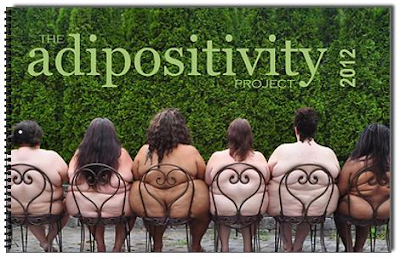There are two--TWO--fantastic fat-themed calendars to hang, flip the pages of, or scrabble on, in 2012. Yeah, I'm dangling my prepositions!
1) The Adipositivity Project wall calendar (11"x17")--twelve months of arty, nsfw, fat lady visuals. Beautiful photography and a worthy, exciting project, as always. I was honored to make a minor contribution to their holiday message.
2. The Fat!So? dayplanner--a cover to decorate yourself, and double pages inside with tips, quotes, images, drawings, and dates to help inform a size-positive year, from Marilyn Wann and others. Here is a brief video showing the book. Proceeds go to build the Weight Diversity Action Lounge, a community center in the SF-area.
Monday, December 19, 2011
on NHANES and data-gathering
Worth reading: this recent interesting post from an interesting blog by Kjerstin Gruys, who is spending a year not looking in mirrors and writing about the experience. Gruys details participating in the CDC National Health and Nutritional Examination Survey (NHANES) and what it was like to have such detailed information taken and given about her health, especially as a former anorexic.
The part that really leapt out at me was this fascinating paragraph about (basically) the framework within which the CDC is collecting information about weight and food, and how the way it is designed will never allow a full picture [emphases are mine]:
. . . I can honestly say that the NHANES study seems to be biased toward preventing weight gain, as opposed to preventing eating disorders. My first clue didn't come on my "Preliminary Report of Findings" but in the wording of one of the interview questions asked during our home visit. The field interviewer asked me if I'd "ever participated in any weight-loss diets". My answer was "yes." Then she asked me, "How much weight did you lose in your most successful weight-loss attempt?" The NHANES computer program only allowed her to record the (horrifying and unhealthy) amount of weight that I'd lost in my most "successful" attempt, but there was no space to specify that "it was due to anorexia and she could have died." Upon my urging, she added a special note, but I have no idea how this will be handled when the data are analyzed. This is troubling: the wording of this question frames any weight loss as good, which we know isn't true. Another thing I noticed: despite asking me to describe, in detail, every bite of food that I'd eaten in the prior 24 hours, I was never asked whether I'd purged any of this food, or if I had taken laxatives or diuretics (I hadn't, but that's not the point). Through these questions (and non-questions), some of the most dangerous health behaviors - such as crash-dieting, purging, laxative abuse, and extreme food restriction - are made invisible.Worth a read. Thoughtful post.
Subscribe to:
Comments (Atom)



